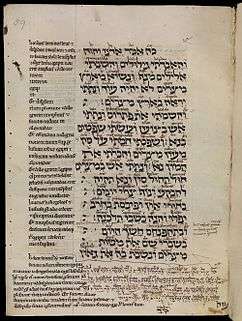Ezekiel 17
| Ezekiel 17 | |
|---|---|
 Book of Ezekiel 30:13–18 in an English manuscript from the early 13th century, MS. Bodl. Or. 62, fol. 59a. A Latin translation appears in the margins with further interlineations above the Hebrew. | |
| Book | Book of Ezekiel |
| Bible part | Old Testament |
| Order in the Bible part | 26 |
| Category | Nevi'im |
Ezekiel 17 is the seventeenth chapter of the Book of Ezekiel in the Hebrew Bible or the Old Testament of the Christian Bible. This book contains the prophecies spoken by the prophet Ezekiel, and is one of the Books of the Prophets.[1]
Text
- The original text is written in Hebrew language.
- This chapter is divided into 24 verses.
Textual versions
Some most ancient manuscripts containing this chapter in Hebrew language:
- Masoretic Text
- Codex Cairensis (895 CE)
- Aleppo Codex (10th century)
- Leningrad Codex (1008-1009)
Ancient translations in Koine Greek:
- Septuagint
- Theodotion version (~AD 180)
Structure
NKJV groups this chapter into:
- Ezekiel 17:1-21 = The Eagles and the Vine
- Ezekiel 17:22-24 = Israel Exalted at Last
Verse 2
- Son of man, put forth a riddle,
- and speak a parable unto the house of Israel (NKJV)[2]
- "Son of man" (Hebrew: בן־אדם ḇen-’ā-ḏām): this phrase is used 93 times to address Ezekiel.[3]
- "Riddle" (Hebrew: חידה khî-ḏāh): the Hebrew word has a meaning of "enigmatic statements that require further interpretation", "allegorical and figurative", "dark, obscure utterance".[4][5]
- "Parable" (Hebrew: משל mā-shāl;): "similitude" which is generally used in proverbs, generally form a comparison.[6][7]
Verse 9
- “Say, ‘Thus says the Lord God:
- “Will it thrive?
- Will he not pull up its roots,
- Cut off its fruit,
- And leave it to wither?
- All of its spring leaves will wither,
- And no great power or many people
- Will be needed to pluck it up by its roots.”’” (NKJV)[8]
- Rashi found out that the entire Hebrew alphabet is found in this verse.[9]
Verse 16
- As I live, saith the Lord God, surely in the place where the king dwelleth that made him king, whose oath he despised, and whose covenant he brake, even with him in the midst of Babylon he shall die.[10]
- The prophecy is fulfilled when Zedekiah died in the prison in Babylon (2 Kings 25:6,7; Jeremiah 39:7; Jeremiah 52:11).[11]
Verse 23
- On the mountain height of Israel I will plant it;
- and it will bring forth boughs, and bear fruit, and be a majestic cedar.
- Under it will dwell birds of every sort;
This "messianic allegory" is presented with the reference to the "branch" in Isaiah 11:1; Jeremiah 23:5-6; Zechariah 3:8, which grows to be "a majestic cedar."[13]
See also
- Related Bible parts: 2 Kings 24, 2 Chronicles 36, Isaiah 11, Jeremiah 37, Jeremiah 52, Ezekiel 29, Ezekiel 30, Matthew 13
Notes and references
- ↑ Theodore Hiebert, et al. 1996. The New Interpreter's Bible: Volume VI. Nashville: Abingdon.
- ↑ Ezekiel 17:2
- ↑ Bromiley 1995, p. 574.
- ↑ Brown, 1994 & "חִידָה".
- ↑ Gesenius, 1979 & "חִידָה".
- ↑ Brown, 1994 & "מָשָׁל".
- ↑ Gesenius, 1979 & "מָשָׁל".
- ↑ Ezekiel 17:9
- ↑ Rashi's commentary on Ezekiel 17:9.
- ↑ Ezekiel 17:16
- ↑ Huey 1993, p. 343.
- ↑ Ezekiel 17:23
- ↑ The New Oxford Annotated Bible with the Apocrypha, Augmented Third Edition, New Revised Standard Version, Indexed. Michael D. Coogan, Marc Brettler, Carol A. Newsom, Editors. Publisher: Oxford University Press, USA; 2007. pp. 1201-1203 Hebrew Bible. ISBN 978-0195288810
Bibliography
- Bromiley, Geoffrey W. (1995). International Standard Bible Encyclopedia: vol. iv, Q-Z. Eerdmans.
- Brown, Francis; Briggs, Charles A.; Driver, S. R. (1994). The Brown-Driver-Briggs Hebrew and English Lexicon (reprint ed.). Hendrickson Publishers. ISBN 978-1565632066.
- Clements, Ronald E (1996). Ezekiel. Westminster John Knox Press. ISBN 9780664252724.
- Gesenius, H. W. F. (1979). Gesenius' Hebrew and Chaldee Lexicon to the Old Testament Scriptures: Numerically Coded to Strong's Exhaustive Concordance, with an English Index. Translated by Tregelles, Samuel Prideaux (7th ed.). Baker Book House.
- Huey, F. B. (1993). The New American Commentary - Jeremiah, Lamentations: An Exegetical and Theological Exposition of Holy Scripture, NIV Text. B&H Publishing Group,. ISBN 9780805401165.
- Joyce, Paul M. (2009). Ezekiel: A Commentary. Continuum. ISBN 9780567483614.
External links
Jewish
Christian
This article is issued from
Wikipedia.
The text is licensed under Creative Commons - Attribution - Sharealike.
Additional terms may apply for the media files.